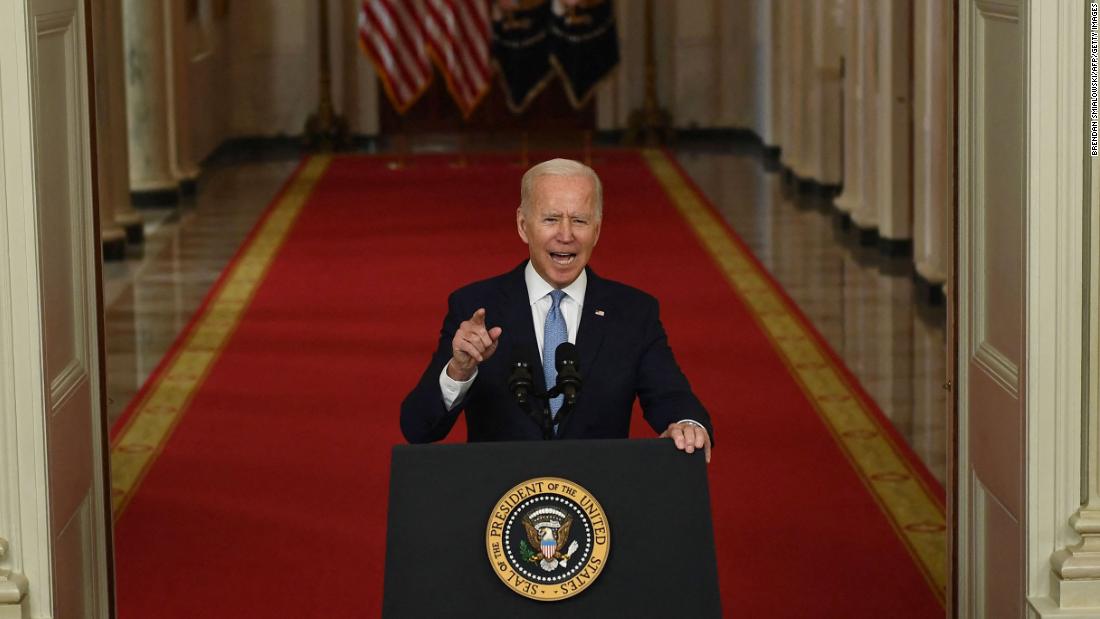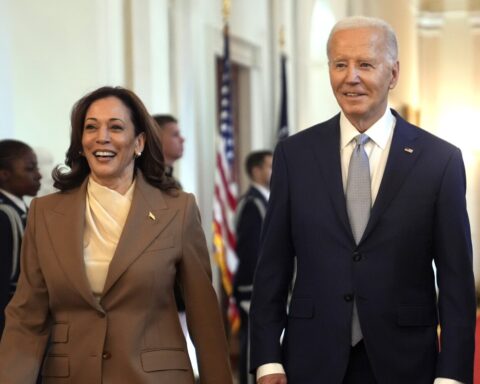President Joe Biden may have ended the “forever war” but the dangerous loose ends he left behind in Afghanistan could still thwart his attempt to throw everything at his top priority domestic goals.
In a quintessential example of an approach that might be termed “Americans First,” Biden will pivot from the country’s longest war to rebuilding a nation under siege at home from a new Covid-19 assault and severe weather, as more than a million people wilt without power after Hurricane Ida. The President is also eager to get on with selling a multitrillion-dollar infrastructure and social spending proposal that would rebalance the economy toward workers but still faces a complicated path through Congress.
But the messy end to the Afghan conflict, the Americans left behind when the US airlift ended and the geopolitical and national security implications of an anarchic failed state teeming with radicals mean that moving on will be far more complicated than declaring the two-decades-long conflict over.
Biden attempted to draw a firm line under the chaos, recriminations and tragedy of the last two weeks on Tuesday, defiantly defending his handling of a final US withdrawal that exposed him to searing criticism, especially after the deaths of 13 US service personnel in desperate scenes outside Kabul’s airport.
He attempted to shift the focus from the questionable decision-making of the pullout to the broader point that he had ended a war that his three predecessors could not, despite indications that the US project was always going to fail.
How postwar events could still hurt Biden
While the President may prefer to speak about anything else, there are compelling reasons why he should keep an eye on Afghanistan.
The fate of perhaps 100 to 200 Americans who want to leave and were unable to be rescued represent a significant risk for the President. Any deaths or high-profile beatings or hostage situations among such citizens would become a big domestic news story. The plight of tens of thousands of Afghans who worked with the US but were unable to reach Kabul airport and now fear execution by the Taliban represents a less-visible political problem for the White House but remains a potential stain on America’s conscience.
The administration’s apparent confidence in its ability to leverage the Taliban to allow those Afghans to leave seems to contradict the lessons of the movement’s brutal past and could come to be seen as naive.
The most dangerous way that the Afghan exit could still go wrong is if the country again becomes a haven for terrorism that threatens US interests at home and around the world. A resurgence of al Qaeda or a strong push by the ISIS affiliate in the country that requires US boots on the ground would badly embarrass Biden as Republicans try to trap him ahead of next year’s midterm elections. But the President argues the threat is everywhere, not just in Afghanistan.
“We will maintain the fight against terrorism in Afghanistan and other countries. We just don’t need to fight a ground war to do it,” Biden said, after mentioning Syria, Yemen, Somalia and Iraq.
The US does have “over the horizon” capabilities to strike at terrorists. But the deaths of several children in a young Afghan family in an airstrike against a potential ISIS-K car bomb over the weekend in Kabul showed the imprecision of such strategies and the cost of distant warfare with drones.
Another possible downside of Biden’s evacuation is that an already failed Afghan state could tumble into greater anarchy. Massive flows of refugees could leave the country and threaten the stability of neighboring states in Central Asia, and even cause issues in Europe similar to the exodus of Syrians fleeing the civil war in the last decade.
Again, that is likely to be a less of a problem in domestic politics, given the distance from the United States to Afghanistan. But it’s hardly likely to endear Biden to allies not yet convinced of his promises that “America is back” after the estrangements caused by former President Donald Trump. Any fracturing of Afghanistan that also destabilizes nuclear-armed Pakistan and makes a radical Islamic takeover more likely could make the President’s struggle to manage the Afghan withdrawal look simple by comparison. And it would add to already treacherous nuclear challenges from Iran and North Korea.
So while Biden’s withdrawal has prevented additional US casualties in Afghanistan, he remains vulnerable to what happens in that nation and now has a diminished capacity to influence events that could hurt his presidency.
It’s one reason why he said earlier in the crisis that he had been elected to make judgments that no one else can or will make.
“I give you my word with all of my heart, I believe this is the right decision, a wise decision and the best decision for America,” Biden said on Tuesday.
History, however, has yet to have its final say.
Those who bore the burden of war
Biden made the case that ending ground combat in Afghanistan would be viewed kindly by history in highlighting the Americans who fought and died in the battle, even as many Washington elites in politics, military affairs and journalism savaged the US exit and its handling.
“We’ve been a nation too long at war,” Biden said at the White House, in another national address attempting to reframe poor impressions of his leadership in recent days.
“A lot of our veterans and their families have gone through hell — deployment after deployment, months and years away from their families, missed birthdays, anniversaries, empty chairs at holidays, financial struggles, divorces, loss of limbs, traumatic brain injury, post-traumatic stress,” Biden said.
“We see it in the struggles many have when they come home. We see it in the strain on their families and caregivers. We see it in the strain on their families when they’re not there. We see it in the grief borne by their survivors, the cost of war they will carry with them their whole lives.”
It was a moment of compassion and rare insight by a commander in chief into the burdens borne by those who follow his orders on foreign battlefields, and their bereaved relatives when they don’t come home, which carried echoes of Abraham Lincoln’s second inaugural address.
Biden explained his worldview and repudiated pundits who argued that staying in Afghanistan would not incur significant costs.
He was animated, determined and forthright, apparently convinced of the righteousness of his purpose. In essence, he is making a bet that Americans will tolerate the war’s messy exit in order to be rid of it. Following the example of British Prime Minister Winston Churchill, who effectively portrayed the retreat from mainland Europe from Dunkirk in 1940 as a morale-boosting victory rather than the defeat it was, Biden also styled the hurriedly mounted US evacuation after the fall of Kabul as “an extraordinary success.”
The speech was almost entirely devoted to a domestic political audience, despite the fact that a US President’s words ring around the world.
Biden did hail the rescue of 100,000 Afghans in the airlift. But in another sign of this President’s own “America First” approach, there were few words of consolation on behalf of the United States for Afghans who have seen their country rocked by two decades of war, US mistakes that killed civilians and a conflict that has killed thousands of the Afghan soldiers whom Washington trained, and whom Biden berated for failing to fight after withdrawing military support.
Political damage control
There was also a clear political strategy at work. Biden campaigned on competence and empathy, positioning himself as a foreign policy expert who pledged to always level with the American people. Each of those qualities has been tarnished by his performance over the last two weeks.
Republicans will now try to keep the controversy over the withdrawal alive, sketching a narrative of political haplessness in which to fold in other critiques of Biden, including his handling of the pandemic, the influx of migrants on the southern border and rising inflation. The GOP attacks drip with hypocrisy, however, given Trump’s deal with the Taliban for an even more aggressive withdrawal by May 1, which many Republicans praised.
Many of the Republicans calling for consequences for Biden have appeased and enabled the worst attacks on democracy at home by any commander in chief. For instance, one of Trump’s chief whitewashers, House Minority Leader Kevin McCarthy of California, called on Tuesday for the current President to face “accountability” — a process he repeatedly blocks for Trump.
One Republican, however, with the moral clarity to criticize Biden after also holding Trump to account is GOP Sen. Ben Sasse, who voted to convict the former President for insurrection earlier this year in Trump’s second impeachment trial. The Nebraskan condemned Biden for leaving in line with a deadline agreed on with Afghanistan’s new rulers but failing to live up to his pledge not to fully withdraw until all US citizens were rescued.
“He kept his promise to the Taliban and lied to the American people. These lies will cost Americans for decades to come,” Sasse said.





